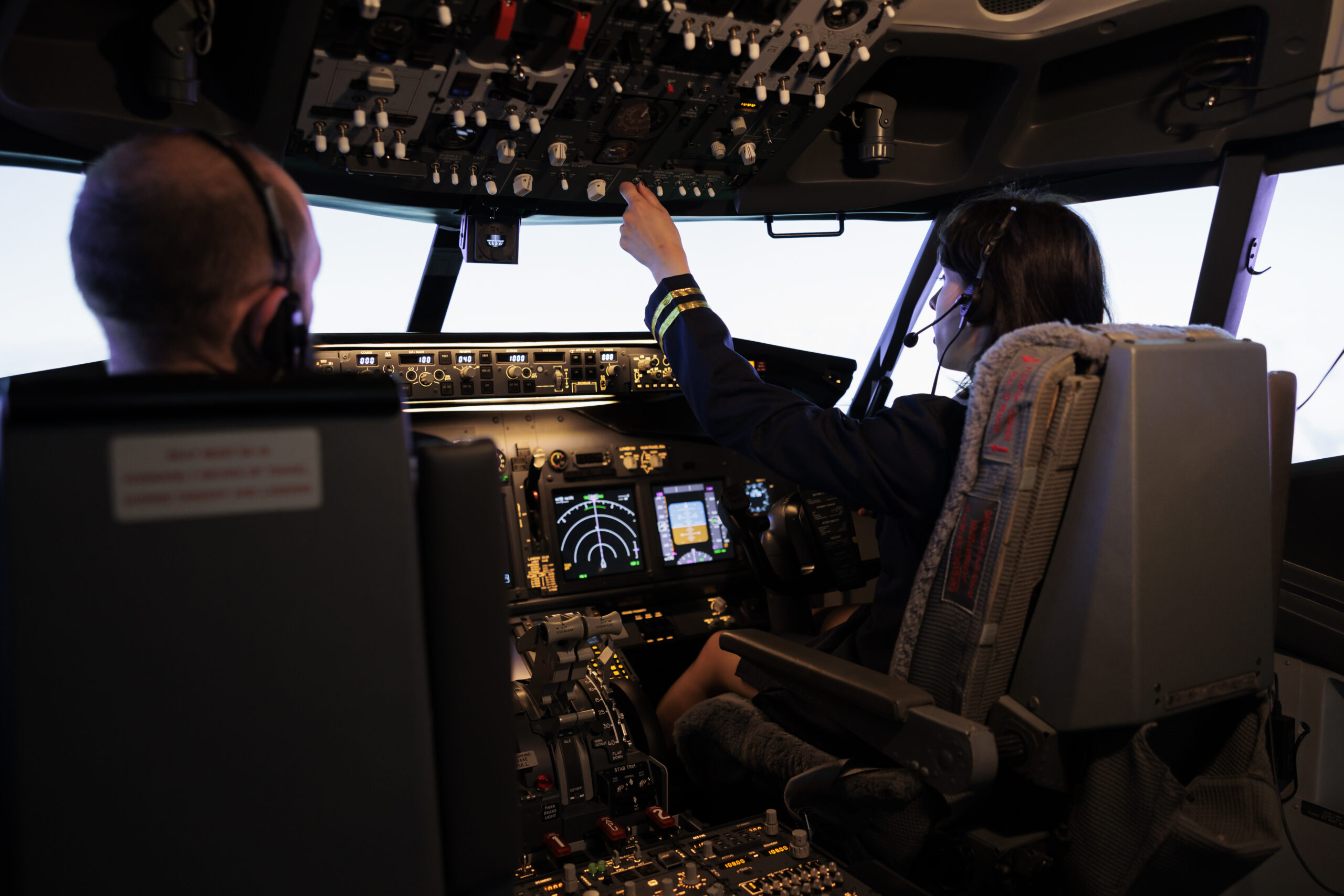Prioritizing Health in the Skies: A FREE 101 Lifestyle Handbook for Pilots and Aircrew
DOWNLOAD YOUR FREE COPY OF OUR HANDBOOK HERE
Working in the skies, flying thousands of miles above the ground—sounds glamorous, right? But for pilots and aircrews, it comes with unique challenges. From irregular schedules and frequent time zone shifts to long hours and the constant stress of flying, maintaining good health becomes a real balancing act. It is not just about surviving these demands but thriving despite them.
Over the past decade, I have had the privilege of working with pilots and aircrew members from international and domestic airlines. Witnessing the incredible transformation that lifestyle changes can bring, I have seen firsthand how prioritizing health can empower them to perform better, feel more energetic, and support their long-term well-being.
The truth is, you don’t have to sacrifice your health for your job. By adopting smart and sustainable habits, pilots and aircrew can maintain their physical well-being and emotional resilience.
Here are some of the top lifestyle changes we have found most effective—designed specifically to help you thrive in the skies. Share this essential handbook with the pilots and aircrews among your loved ones to ensure they prioritize their health and well-being, too.

What Are Some Key Risk Factors for Pilots and Aircrew?
Let’s delve into some of these and how to move to action with simple lifestyle tips.
#1 Dehydration:
Frequent flying, cabin pressure, low humidity, and air conditioning often lead to dehydration.
Common symptoms include:
- Bloating
- Reduced immunity
- Muscle stiffness
- Fatigue
- Headaches
- Dry skin
Prolonged dehydration can also impair cognitive function and decrease physical performance.
What does science say?
- A study in the American Journal of Clinical Nutrition reported that even mild dehydration can lead to impaired memory, mood changes, and reduced concentration.
- Research published in Aviation, Space, and Environmental Medicine revealed that dehydrated pilots exhibited lower physical and cognitive performance during flights.
Power Lifestyle Tips:
- Stay hydrated by sipping water regularly during flights.
- Avoid excessive caffeine and alcohol as they contribute to dehydration.
- Include hydrating beverages or snacks rich in electrolytes (coconut water, fruits, etc.) to maintain electrolyte balance.
- Herbal teas such as black tea with lemon or green tea can help with focus and alertness.
- Black tea with lemon or green tea over too much coffee on a flight will keep you more energetic and mentally focused.
Special note: Stay ahead of Urinary Tract Infections (UTIs)
Cabin air in airplanes is significantly lower in humidity, often leading to dehydration. This is compounded by long periods between restroom breaks and the reluctance to drink enough water to avoid frequent bathroom visits. Dehydration reduces urine output, allowing bacteria to grow in the urinary tract, and increasing the risk of infection.
Pilots and aircrew often have limited opportunities to use the restroom during flights, especially on long-haul trips. This can lead to prolonged urine retention, which also contributes to bacterial growth and infection.
Power Lifestyle Tips:
- Stay hydrated and carry cranberry extract capsules (under medical supervision).
- Cranberries contain compounds known as proanthocyanidins (PACs), which have been shown to prevent bacteria, particularly E. coli, from adhering to the lining of the urinary tract.
- By inhibiting bacterial adhesion, cranberry extract can reduce the risk of recurrent UTIs, which are a common issue for many people, especially women.
- A study published in the American Journal of Obstetrics and Gynecology found that cranberry extract can reduce the risk of recurrent UTIs, especially in women with a history of such infections.
- Research published in JAMA Network Open concluded that cranberry extract could be just as effective as low-dose antibiotics in preventing recurrent UTIs without contributing to antibiotic resistance, a growing global concern.
Remember: While cranberry extract can be helpful in preventing UTIs, it should always be used under medical supervision, especially for those on medications or with pre-existing health conditions. Keep your doctor in the loop before adding anything new to your lifestyle.
Additional Resource:
- Are You Drinking Water Right or Wrong? Find Out
- Urinary Tract Infection (UTI): Causes, Symptoms, and Remedies
#2 Blood Clots and Deep Vein Thrombosis (DVT)
Sitting for long periods on flights, especially international ones, increases the risk of blood clots or Deep Vein Thrombosis (DVT). DVT can lead to serious complications if a clot travels to the lungs (pulmonary embolism).
This is not to scare you but to make you aware.
What does science say?
- A study in The New England Journal of Medicine found that the incidence of DVT increases significantly with long-haul flights due to prolonged immobility.
- Research published in The Lancet showed that wearing compression socks reduced the incidence of DVT in air travelers by over 90%.
Power Lifestyle Tips:
- Engage in simple leg exercises like ankle circles, calf stretches, and walking every few hours during flights.
- Wear compression socks for long-haul flights to improve circulation.
- Stay hydrated to improve circulation and reduce the risk of blood clots.
- Get daily movement. You don’t need expensive gym memberships for this. Focus on challenging and building muscle, cardio, flexibility, mobility, endurance, resistance, and strength.
Additional resources:
- Try These 10 Bodyweight Exercises to Build Lean Muscle
- Why Gaining Muscle Is Important To Lose Fat And How To Do It
#3 Circadian Rhythm Disruption
Constant time zone changes and irregular working hours disrupt the body’s natural circadian rhythm, leading to sleep disorders, fatigue, and impaired cognitive function. This can result in poor concentration, mood swings, and decreased reaction times, increasing the risk of accidents.
Irregular sleeping patterns, jet lag, and long shifts also contribute to chronic fatigue.
What does science say?
- A study in the Lancet showed that irregular circadian rhythms in pilots and crew can lead to long-term issues like insomnia, metabolic disorders, and cardiovascular diseases.
- Research published in the Journal of Occupational Health Psychology found that up to 68% of aircrew suffer from some form of sleep disturbance due to jet lag and irregular shift patterns.
Power Lifestyle Tips:
- Maintain consistent sleep patterns based on your roster.
- Use eye masks and earplugs. Create a sleep-conducive environment with complete darkness to improve sleep quality. Use black-out curtains if required. The darker the room, the deeper your sleep.
- Avoid screen time before sleep.
- When you get a sleep break, take it and use it well. Aim for 7-9 hours of quality restorative sleep for repair, recovery, and overall well-being.
- Try to expose yourself to natural light (morning or evening sun) to help regulate circadian rhythms and prevent jet lag.
- Use blue light-blocking glasses during nighttime flights to minimize disruption to your melatonin production.
Additional Resources:
- A New Way of Living – Circadian Rhythm – A Free Ebook by Luke Coutinho
- Harnessing Nature’s Wisdom: Circadian Medicine for Stress Relief & Overall Well-being
- Working Night Shifts? Here Are 10 Ways to Sleep Better Today
- My Top 3 (And Scientifically Proven!) Lifestyle Changes To Sleep Better
#4 Hormonal Imbalances
Shifts in time zones and irregular sleep schedules disrupt the body’s circadian rhythm and affect hormone production. This can lead to issues such as weight gain, energy depletion, and mood swings among pilots and aircrew.
What does science say?
- A study in the Journal of Clinical Endocrinology & Metabolism (2016) showed that circadian misalignment, due to shift work and time zone changes, significantly impacts cortisol, melatonin, and insulin levels, contributing to metabolic and hormonal imbalances.
- A study published in the Journal of Clinical Sleep Medicine (2019) found that sleep disruptions due to shift work or travel across time zones led to imbalances in key hormones such as ghrelin, leptin, and testosterone, which in turn affect appetite regulation, weight, and overall energy levels.
Power Lifestyle Tips:
- Maintain healthy body weight and skeletal muscle mass. Building lean muscle mass through regular movement and a protein-rich diet supports hormonal health.
- According to research in Frontiers in Endocrinology (2020), skeletal muscle serves as an endocrine organ, producing myokines that interact with hormones like insulin, leptin, and adiponectin. This helps regulate metabolism and hormonal balance, particularly under stress or erratic schedules.
Additional Resources:
- Episode 417 – Natural Ways to Balance Hormones
- Hormonal Imbalance and How to Balance Them Naturally
- Stay Alert Of These Hormone Disruptors
#5 Mental Health Stressors
The constant stress from irregular schedules, high levels of responsibility, and separation from family can lead to chronic stress, anxiety, and depression. Pilots and aircrew are often exposed to high-stress situations that can affect emotional well-being over time.
What does science say?
- A study published in Aviation Psychology and Applied Human Factors found that pilots experience high levels of chronic stress due to irregular schedules and high job demands, which increases their risk of anxiety and burnout.
- Research published in Occupational Medicine revealed that airline pilots are prone to depressive symptoms, with 12.6% of the cohort showing signs of clinical depression.
Power Lifestyle Tips:
- Incorporate stress-management techniques such as meditation, deep breathing, mindfulness exercises, or engaging in prayer to promote emotional well-being.
- Stay connected with family and friends despite the distance. Emotional support from loved ones is crucial for managing stress.
- 10 minutes of daily breathwork/pranayama with consistency improves lung health, energy levels, and sleep quality. This practice also helps you fall asleep faster and alleviate stress. Limit screen time during flights to support emotional and mental balance.
Additional Resources:
- Master The Art Of Mindfulness (Meditation Series by Luke Coutinho)
- Stressed? Anxious? Stuck In Victim Mode? Try This Technique
- From Stress to Relaxation in Under 3 Minutes With Luke’s Slump, Dump, and Pump Technique
- Stressed? Try Some of These Asanas To Feel Better
#6 Vitamin D Deficiency
Pilots and aircrews spend long hours indoors in planes and airports, leading to limited exposure to sunlight. This increases the risk of Vitamin D deficiency, which is linked to weakened immunity, mood disorders, and poor bone health.
What does science say?
- A study published in the Journal of Investigative Medicine highlights that Vitamin D plays a crucial role in modulating the immune system. Deficiency can impair the body’s ability to fight infections and increase susceptibility to autoimmune diseases.
- Research in the Journal of Affective Disorders (2013) found that low Vitamin D levels are associated with an increased risk of depression and mood disturbances, particularly in individuals with limited sunlight exposure. Given that Vitamin D receptors are present in brain areas involved in mood regulation, deficiency could exacerbate conditions like seasonal affective disorder (SAD).
- According to a review in The American Journal of Clinical Nutrition (2018), Vitamin D is essential for calcium absorption and bone mineralization. Deficiency can lead to weakened bones, increasing the risk of fractures and osteoporosis.
Power Lifestyle Tips:
- Vitamin D is essential for mood regulation, immune function, and circadian alignment. Make an effort to get at least 15-20 minutes of natural sunlight per day, (morning or even evening sun) depending on your schedule to boost Vitamin D production.
- Regularly check Vitamin D and B12 levels every three to six months and take supplements under the guidance of an expert if required, especially during the winter months or during periods of minimal sun exposure.
Additional Resources:
- Did You Get Your Dose of Sunshine? Here Are 9 Scientific Reasons to Start Today
- Vitamin D3: Your Key to Fat Loss, Radiant Skin, Better Gut, Hormonal Balance, and Cancer Prevention
- Here’s Why The Timing of Your Vitamin D Supplement Matters: A Real-Life Lesson
#7 Digestive Issues and Poor Nutrition
Frequent flying and irregular eating patterns can lead to digestive issues such as bloating, constipation, and indigestion. Poor in-flight meal choices, often high in processed foods and sugars, can exacerbate these issues.
What does science say?
- A study in Aviation, Space, and Environmental Medicine found that irregular eating patterns during flights negatively affect digestion and metabolism.
- According to research in Sleep Medicine Reviews (2018), aviation crew members often suffer from chronic sleep deprivation due to long hours and irregular sleep patterns. This directly impacts digestive function, as insufficient sleep is linked to poor gut motility and increased inflammation in the gastrointestinal tract, raising the risk of conditions like gastroesophageal reflux disease (GERD).
- Another study from Occupational Medicine (2020) reported that high stress among pilots and flight attendants due to demanding job conditions and constant travel negatively impacts digestive health. Stress triggers the fight or flight response, diverting blood away from the digestive organs, which can result in issues such as stomach cramps, nausea, and loss of appetite.
Power Lifestyle Tips:
- Prioritize deep cellular nutrition.
- Choose meals rich in lean proteins, healthy fats, whole grains, and a variety of fruits and vegetables.
- Avoid excess carbohydrates, sugar, and alcohol on flights to prevent energy crashes.
- Keep your carbs smart and low. Feel fuller and maintain stable energy levels throughout the flight with the right balance of healthy fats, protein, and vegetables.
Additional Resources:
- Lifestyle Hacks To Improve Digestion
- Acidity? Indigestion? Bloating? Try This 3-Ingredient Concoction For Better Gut Health
#8 Musculoskeletal Issues
Prolonged sitting, awkward postures, and lack of movement contribute to musculoskeletal problems such as back pain, neck stiffness, and reduced mobility. These issues can affect long-term physical function.
What does science say?
- A study published in Spine found that pilots and aircrews are at higher risk for developing chronic back pain due to long periods of sitting and poor ergonomics.
- Research in the Journal of Occupational Medicine linked awkward sitting postures during long-haul flights to musculoskeletal disorders, particularly in the lower back and neck.
Power Lifestyle Tips:
- Perform mobility exercises and stretches during breaks to improve flexibility and relieve tension.
- Pay attention to ergonomics when sitting during flights. Support your lower back and maintain a neutral posture.
Additional Resources:
- The Importance of Right Posture for Life, Health & Confidence
- 5 Must-Do Yoga Postures for Impossibly Busy Days
- Building Lean Muscle: The Quickest Way to Lose Fat Without the Gym Grind
Final Thoughts

We believe that the unique challenges faced by pilots and aircrew can be effectively managed through intentional lifestyle choices. By embracing these small yet powerful adjustments, you not only protect your own health but also set an example for your peers in the industry. It may be difficult but difficult doesn’t mean impossible.
Share this handbook with your friends, family, and fellow crew members. Tag your loved ones in aviation to create a ripple effect of wellness throughout the airline community. Remember, your health is an investment, not a cost. These changes are not expensive. All they need is discipline and consistency. Keep flying high.
Thank you for your service.
Wishing you the best of health always,
Luke Coutinho
DOWNLOAD YOUR FREE COPY OF OUR HANDBOOK HERE
Disclaimer: The information provided here is for educational and informational purposes only. It is not intended as a substitute for professional medical advice, diagnosis, or treatment. Always consult your healthcare provider before making changes to your nutrition, lifestyle, or healthcare regimen, especially if you have existing medical conditions or are taking prescribed medications.
If you are in the aviation space and need personalized guidance to take charge of your health, we help you find a way.
Get in touch with our team by calling 1800 102 0253 or writing to us at info@lukecoutinho.com.
|
From a pimple to cancer, our You Care Wellness Program helps you find a way Talk to our integrative team of experts today 18001020253 |










Leave a Reply